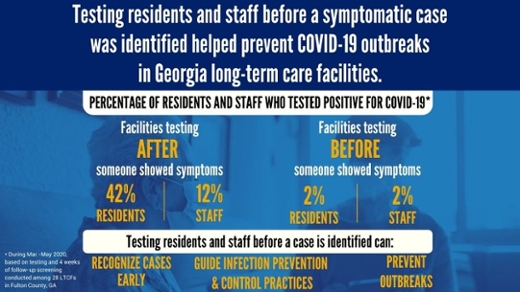Emory University researchers, in collaboration with Fulton County Board of Health (FCBOH), have found that testing for COVID-19 in long-term care facilities (LTCFs) before cases were known to occur resulted in lower overall COVID-19 cases. The results of the study were recently published in CDC’s MMWR Early Release report.
The team conducted one-day mass testing events in 28 Fulton County LTCFs and four weeks of symptom-based follow-up screening. A total of 5,671 residents and staff were tested. In facilities where preemptive testing and follow-up screening was conducted, 1.5 percent of residents and 1.7 percent of staff members tested positive, compared to 42.4 percent of residents and 11.8 percent of staff testing positive in facilities where testing was done after a COVID-19 case was known to occur.
Sarita Shah, MD, MPH, associate professor of global health, epidemiology and infectious diseases at Emory University’s Rollins School of Public Health, is senior author of the paper and says that the study provides data to support the need for proactive testing.
“Testing is the cornerstone of controlling this pandemic, together with infection prevention and control measures,” says Shah. “Our study is further proof that we need to redouble efforts to provide testing and rapid results that can be acted upon to stop the spread of this disease.”
Authors say that mass testing for COVID-19 has been an effective strategy for identifying asymptomatic and pre-symptomatic infections, but this study adds support for this proactive approach to find cases early and prevent potential outbreaks among this vulnerable population.
This study was a result of increased academic-public health department collaborations between Emory University and FCBOH.
“This type of impactful analysis is what we can accomplish when we work together. Concerted efforts such as this are essential to the important work we do in public health to reduce the spread of COVID-19. I hope to see more of this as we continue to deepen our collaborations with academic partners like Emory,” says Lynn Paxton, MD, MPH, district health director for Fulton County Board of Health.
Shah serves as a faculty advisor to the Emory COVID-19 Response Collaborative (ECRC), an initiative launched in June 2020 to support Rollins faculty, staff and students interested in collaborating with state and local health department partners on Georgia’s COVID-19 response.
“One of the greatest parts about this study is that it was conducted by an interdisciplinary team of public health practitioners, faculty and trainees,” says Allison Chamberlain, PhD, who directs the ECRC. “This is exactly what the ECRC endeavors to support. The collaborative process of this study was just as impactful as its findings.”

